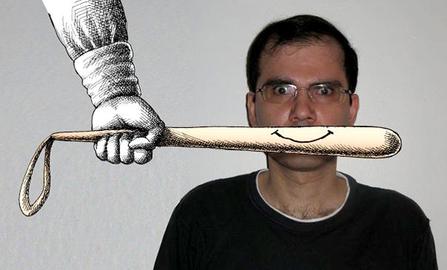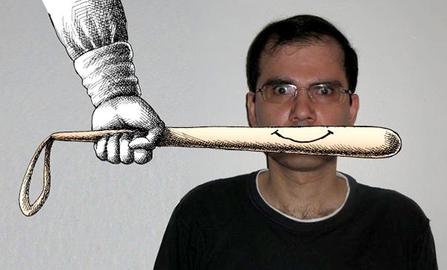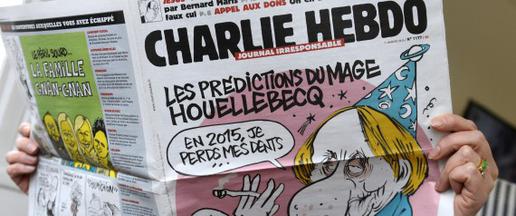
Iranian cartoonist Mana Neyestani lives in Paris and has had some of his cartoons published in the satirical French publication Charlie Hebdo. Four cartoonists were among those who were killed by terrorists on the morning of Wednesday January 7. Neyestani knew some of the victims of yesterday’s terrorist attack, and is familiar with many of the publication’s contributors.
We talked to Neyestani to get a better understanding of Charlie Hebdo and the mindset of its editorial board. The magazine had been threatened many times before and, in 2011, its offices were set on fire. Why did it continue publishing cartoons that lampooned Islam in spite of this event and in the face of other threats? Why do extreme Islamists react to such cartoons in this way? We asked him what he thought about the background to yesterday’s attacks, free speech and the right to offend.
You have worked with Charlie Hebdo and knew its cartoonists. The weekly publication has often published anti-religious cartoons. How did they react to threats and terrorism? What has been their mindset?
Early on, when I arrived in France and was a guest of the Paris mayor, I was taken to the offices of the magazine, where I met some members of the editorial board. Our cooperation did not last long because we had different views and styles but they published a number of my works.
I knew the cartoonists who were killed. Two years ago, I participated, along with Charb [Stéphane Charbonnier, editor–in-chief of Charlie Hebdo] in a round table organized by the newspaper L'Humanité. He was a cultured and respectable man who held clear and definite views about freedom of expression and did not shy away from them.
The other time that their offices were attacked they took the position that “we make fun of everybody including Jesus. We are anti-religion and in France we have the right to say anything we want against religion.” The magazine followed this approach in practice. It had a very crude joke about Mary and Jesus a few days ago around Christmas and the new year. Opposing religion has always been the Charlie Hebdo way.
As you mentioned, the offices of Charlie Hebdo had been attacked before. In your dealings with its cartoonists and its editorial board, did you ever talk about staying away from Islamic subjects, considering the spread of extreme Islamism and the fact that they had been threatened and attacked before?
In the same roundtable that I mentioned, Charb said that “we will never retreat from our position that we can and we must express our convictions. Why should we abandon this position because it irritates a certain group?” He could not understand why he could make fun of some religions but not one specific one.
Charb mentioned something else that I will never forget. He said in that year about 12 complaints had been filed against his publication, 11 by Christians and only one by an Islamic group. His conclusion was that this did not show that his magazine’s critics were mostly Muslim, but that Muslims were not in the habit of following their complaints through legal channels. He said that they prefer to pour into the streets, explode bombs and express other strong reactions.
Of course Charlie Hebdo was not all about opposing religion.
This publication irritated everybody, not only religious groups but also politicians. Charlie Hebdo’s style is not a pasteurized, polite and cautious one. It uses all tools at its disposal, from joking to lampooning to ridicule, to say what it wants to say. This is their style.
But this attack should not have been unexpected because it had happened before.
Correct. It was not unexpected considering previous threats and attacks, but it was shocking all the same. The news that four cartoonists were butchered shocked me deeply. For a few moments I was completely numb and could not believe that they are no longer with us. I can only say that I am extremely sad and heartbroken.
Why do you think there is so much sensitivity towards cartoons? There are perhaps thousands of articles and writings that question or deny religion but they do not lead to such reactions.
I have yet to make up my mind as to whether this is because pictures communicate more easily or because cartoons have a sharper tongue and convey their intent faster. Cartoons convey their cutting message in a very short time. Is this feature a more convenient excuse for the extremists? There might be a thousand reasons behind it that we do not know anything about and must be investigated.
In many of the streets in Paris, soldiers with machine guns are stationed. Two policemen were guarding the offices of Charlie Hebdo because it had been threatened repeatedly and was obviously a target for terrorists. The question is: how come the French government is incapable of providing security for such a publication? How were the terrorists able to enter the offices of Charlie Hebdo in broad daylight, do what they wanted to do and then escape?
Such acts of terror have a long record in France. More than a year ago members of the PKK [The Kurdistan Workers' Party of Turkey] were killed in their offices. How can these things happen and be missed by French officials and security forces?
It seems that today’s attack on Charlie Hebdo was carried out by extremists who are likely to be Muslims. But we don’t know who was pulling their strings.
What do you personally think about cartoons that offend religion in general or Islam in particular?
Perhaps I wouldn't draw such cartoons. Everybody has his own principles and criteria and feels that by following his own path he can influence society deeper and better. Perhaps I feel that my audience, many of whom are religious, would not appreciate me ridiculing religion and would not get the message. Therefore I choose another way to influence them. Maybe Charlie Hebdo’s way is different from mine, but it makes no difference when talking about whether Charlie Hebdo should exist or not.
Charlie Hebdo must be allowed to publish whatever it wants to publish and nobody has the right to threaten them and deny their right to free expression. When we talk about free expression, it also means the freedom to ridicule and offend. What is not a joke is the lives of human beings. Even if a cartoonist commits the biggest insult in the world, nobody has the right to take his life away with a bullet.
We must accept that we all have a right to live and respect other people’s lives. Nobody should take away the life of another person in protest. If the insults and the mockeries justify legal action, then complaints must go through the law and the courts. If a law has been broken, then it must be pursued through the courts and not by terrorist actions.
visit the accountability section
In this section of Iran Wire, you can contact the officials and launch your campaign for various problems






















comments